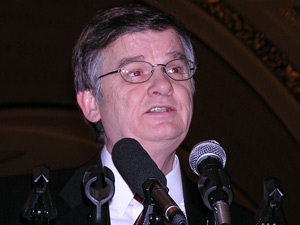Photos
| ||||||||||||||||||||||||||||||||
April 29, 2005
St. Paul, Minn. — (AP) - House Republicans narrowly passed a hard-hitting budget bill Friday that Democrats said would further squeeze government-subsidized child care, job-training and housing programs.
All 68 Republicans backed the bill while the 66 DFLers voted against it. Compared to spending that would occur if current law continued, the bill trims $250 million from the two-year state budget. It calls for $1 billion in total spending on employment and economic development needs.
"We took the money we had and did the most we could with it," said Rep. Bob Gunther, the Fairmont Republican who heads the House Jobs and Economic Opportunity Policy and Finance Committee.
Democratic Rep. Karen Clark of Minneapolis panned the bill as a recipe for "lost opportunity, lost jobs, lost housing, lost child care."
About $15 million of the cuts would be restored if the Legislature passes a casino expansion bill, which only infuriated Clark more.
"We'll wait and see if we're going to have slots for tots," she said.
Child care centers that serve low-income families would see their reimbursement rates stay flat for another two years. The move - estimated to save the state $63.6 million - will hurt providers already operating on tight margins, said Jim Koppel, director of the Children's Defense Fund of Minnesota.
"If you are a provider with families who are receiving this assistance you are being paid at rates that are four years old, you either eat the difference or pass it on to the family," Koppel said.
When lawmakers froze rates in 2003, some 10,000 children eligible for state-aided care dropped off of licensed child care and Koppel said more would if this bill became law. That's because some parents won't be able to pay added costs and some providers might take fewer children if their reimbursements are flat.
Rep. Pat Garofalo, R-Farmington, said the bill leaves child-care copays as they are, so any increases in cost to the parents would be decided by providers. A single parent with two children making $30,000 a year would continue to pay $27 per child a week, he said.
Republicans touted a 25 percent reduction in the fee to license child-care centers, which is based on the number of children at the center. Marriage license fees would also fall from $85 to $75.
Various job training and housing programs would take hits. The displaced homemakers program, which helps stay-at-home wives re-enter the work force, would be cut by $1.5 million for instance and the Minnesota Housing Finance Agency would have $8.5 million less to carry out various housing assistance programs.
But the bill also reverses some budget decisions of two years ago. A $2 per-child fee on school groups taking Capitol tours would expire and several historical sites would see funding restored.





